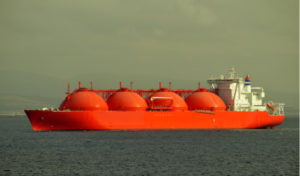
Asian markets have long been big recipients of seaborne liquified natural gas (LNG) shipments from exporting countries like the United States. Now, though, European nations are attempting to buy from the same supplies of LNG. The result is a battle brewing in the market to secure gas supplies. Shotaro Tani reports in the Financial Times:
The battle between Asia and Europe to lock in gas supplies is stepping up a gear, heightening the risks of a further surge in prices that would add fresh fuel to the cost of living crisis.
Japan and South Korea, the world’s second- and third-biggest importers of liquefied natural gas, are looking to secure supplies for the winter months and beyond, out of fear of being priced out later in the year as Europe’s demand increases, according to traders.
The intensifying competition from Asia comes at a time when LNG, which is shipped across the sea in giant tankers, is in high demand as Europe attempts to replace natural gas delivered through pipelines from Russia. Natural gas prices in Europe are already up almost five times from a year ago, which has sharply increased energy costs for consumers and dealt a painful blow to utility companies.
“What we are seeing is a bit of a scramble to secure LNG cargoes through the end of this year and into 2023,” said the chief executive of an Asia-based gas company, adding that the move was earlier than usual.
“It hasn’t fed through so much into pricing yet, but that will come next because the late purchaser will be the ones that will bear the burden on pricing.”
There was “fairly large activity” from Japanese and South Korean companies for so-called strip purchases of LNG “that would take it through November, December and January”, said Toby Copson, global head of trading and advisory at Trident LNG, a gas trading company.
A strip contract is the buying or selling of contracts in sequential months, with buyers and sellers able to lock in prices for the entire timeframe.
Japan and South Korea “have an issue with energy security. They are genuinely concerned about what will happen short, medium and long term,” Copson said. “I think this year and through into the first quarter next year, you’re going to see consistent competition with [Europe and Asia] bidding the market up.”
Asia had been the premium destination for LNG, with China, Japan and South Korea being the world’s three largest importers. The benchmark price in Asia, more times than not, has traded above the European price.
But TTF, the European benchmark gas price, is now considerably higher than its Asian counterpart due to Europe’s increasing demand, as the region looks to substitute declining Russian gas. Since late July, Russian gas flows from Europe’s main pipeline Nord Stream 1 has tumbled to 20 per cent of its capacity. Officials fear further cuts ahead.
Read more here.



